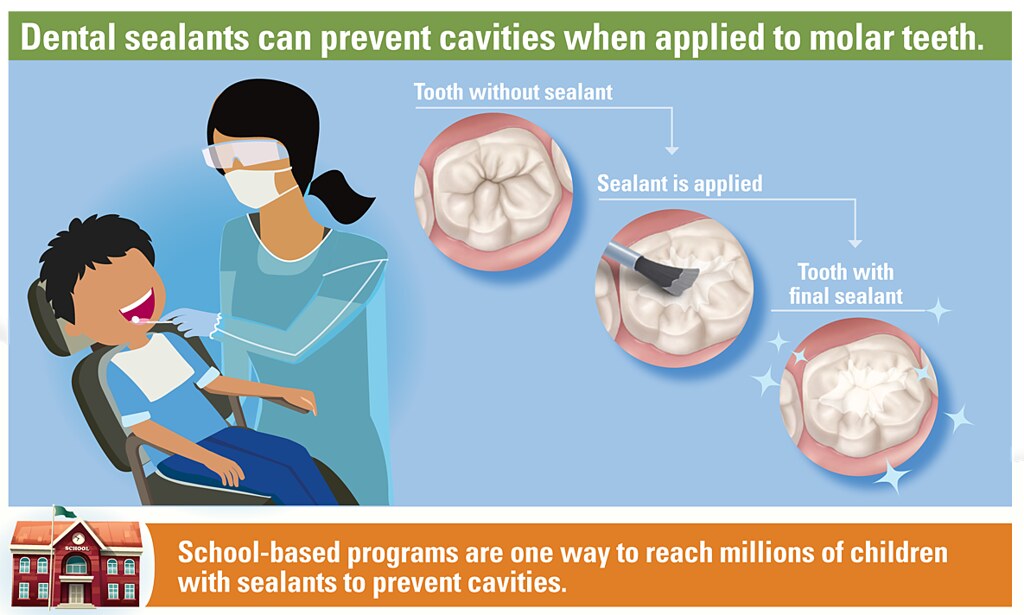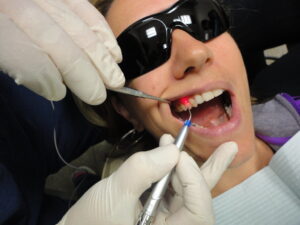Your dentist may have recommended a sealant for teeth. You might be wondering if it is worth the cost and trouble. Find out what are dental sealants and why you should consider getting them.
Are sealants for teeth the same as fillings?
No, sealants for teeth and dental fillings are not the same thing. Sealants for teeth are thin, plastic coatings that are painted onto the chewing surfaces of teeth. They are mainly applied on the teeth used for chewing that are located in the back of the mouth – these are called the premolars and molars. Teeth sealants fill the depressions and grooves on the chewing surfaces of these teeth and form a protective covering over the enamel.
Dental fillings are made from plastic, metal, glass, and other materials. They are used to fill cavities or holes in areas of tooth decay after your dentist has cleaned out the decay. Fillings are also used to repair chipped or cracked teeth in which the enamel has been worn away from teeth grinding or nail biting.
So, the main difference between a sealant for teeth and a filling is that the former is a preventative measure while the latter is a restorative treatment. In other words, a sealant for teeth prevents cavities from forming while a filling fills cavities that have already formed.
Is a sealant necessary on teeth?
A sealant for teeth can help to prevent cavities from forming in permanent premolars and molars. These back teeth are vulnerable to tooth decay because they are difficult to clean. A dental sealant can fill the pits and ridges on the chewing surfaces of these teeth. This prevents food particles and bacteria from collecting on these teeth. We generally recommend dental sealants for children and teenagers after their permanent molars have come in.
Can front teeth be sealed?
Dental sealants cannot be used on the front teeth because they do not have a large, flat chewing surface with depressions and grooves. A sealant for teeth is reserved for premolars and molars because they have pits and ridges that can be filled with the sealant material.
Can a sealant fix a cavity?
If your dentist feels like a cavity will form in an area, a sealant for teeth can halt the process of cavity formation. However, if a cavity has already formed, a filling is more effective.
What is the best age for dental sealants?
The best age to get a sealant for teeth is soon after the permanent molars come in, which is around age 6 years for the 1st molars and around age 12 years for the 2nd molars.
How long does a tooth sealant last?
As mentioned, a sealant for teeth forms a protective covering and protects the teeth against food particles and bacteria. After they are applied, dental sealants can prevent up to 80% of cavities in the first 2 years and 50% of cavities for up to 4 years. The treatment can be repeated every 4-5 years to keep cavities at bay.
What are the disadvantages of a sealant for teeth?
The main disadvantage of a sealant for teeth is that it is not permanent. Most dental sealants need to be replaced within 5 years. If you don’t have dental insurance or your plan doesn’t cover sealants, then cost is a factor to consider. Also, a sealant for teeth may not be right for everyone. For example, if you have already developed tooth decay, a sealant for teeth may cause more harm than good by sealing in bacteria and acids into the decayed tooth.
How much does it cost to seal teeth?
A sealant for teeth usually costs $40-$50 per tooth. Your dental insurance plan may cover dental sealants and you may not have to pay the entire cost out of pocket. If you’re not sure if sealants are worth it, talk to your dentist about the pros and cons.
Can I seal my teeth at home?
Do not try to seal your teeth at home. A sealant for teeth is made from a special material and only a dental professional can apply it. Trying to seal your teeth at home can result in serious complications. If you have a chipped or cracked tooth, you can use sugarless chewing gum as a temporary sealant until you can get in to see your dentist.
If you are considering dental sealants and have further questions for a dentist, give Express Dentist a call. We will be happy to connect you to a dentist in your area who can answer all your questions and tell you if you qualify to get a sealant for teeth.
About the author

Dr. Greg Grillo
Dr. Greg Grillo DDS studied at the University of Washington where he received a bachelors degree with Honors and later attended dental school on the same campus. Following school Dr. Greg served in the United States Navy as a dental officer. During this time he received advanced training in specialty areas of dentistry while also treating families of members of the military.
As well as sharing valuable information on dentistry and oral health, Dr. Greg remains a practicing dentist to this day. He works with families in the Okanogan Valley where he lives with his wife and three children.
- Dr. Greg Grillo
- Dr. Greg Grillo
- Dr. Greg Grillo
- Dr. Greg Grillo
- Dr. Greg Grillo
- Dr. Greg Grillo
- Dr. Greg Grillo
- Dr. Greg Grillo
- Dr. Greg Grillo
- Dr. Greg Grillo
- Dr. Greg Grillo
- Dr. Greg Grillo
- Dr. Greg Grillo
- Dr. Greg Grillo
- Dr. Greg Grillo
- Dr. Greg Grillo
- Dr. Greg Grillo
- Dr. Greg Grillo
- Dr. Greg Grillo
- Dr. Greg Grillo
- Dr. Greg Grillo
- Dr. Greg Grillo
- Dr. Greg Grillo
- Dr. Greg Grillo
- Dr. Greg Grillo
- Dr. Greg Grillo
- Dr. Greg Grillo
- Dr. Greg Grillo
- Dr. Greg Grillo
- Dr. Greg Grillo
- Dr. Greg Grillo
- Dr. Greg Grillo
- Dr. Greg Grillo
- Dr. Greg Grillo
- Dr. Greg Grillo
- Dr. Greg Grillo
- Dr. Greg Grillo
- Dr. Greg Grillo
- Dr. Greg Grillo
- Dr. Greg Grillo
- Dr. Greg Grillo
- Dr. Greg Grillo
- Dr. Greg Grillo
- Dr. Greg Grillo
- Dr. Greg Grillo
- Dr. Greg Grillo
- Dr. Greg Grillo
- Dr. Greg Grillo
- Dr. Greg Grillo
- Dr. Greg Grillo
- Dr. Greg Grillo
- Dr. Greg Grillo
- Dr. Greg Grillo
- Dr. Greg Grillo
- Dr. Greg Grillo
- Dr. Greg Grillo
- Dr. Greg Grillo
- Dr. Greg Grillo
- Dr. Greg Grillo
- Dr. Greg Grillo
- Dr. Greg Grillo
- Dr. Greg Grillo
- Dr. Greg Grillo
- Dr. Greg Grillo
- Dr. Greg Grillo
- Dr. Greg Grillo
- Dr. Greg Grillo
- Dr. Greg Grillo
- Dr. Greg Grillo
- Dr. Greg Grillo
- Dr. Greg Grillo
- Dr. Greg Grillo
- Dr. Greg Grillo
- Dr. Greg Grillo
- Dr. Greg Grillo
- Dr. Greg Grillo
- Dr. Greg Grillo
- Dr. Greg Grillo
- Dr. Greg Grillo
- Dr. Greg Grillo
- Dr. Greg Grillo
- Dr. Greg Grillo
- Dr. Greg Grillo
- Dr. Greg Grillo
- Dr. Greg Grillo
- Dr. Greg Grillo
- Dr. Greg Grillo
- Dr. Greg Grillo
- Dr. Greg Grillo
- Dr. Greg Grillo
- Dr. Greg Grillo




